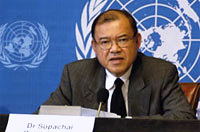The International Symposium on Cultural Diplomacy in Geneva 2012
"Cultural Diplomacy & Sustainable Development"

Symposium Agenda
Nearly a quarter of a century has passed since the release of the 1987 Brundtland report on sustainable development and there is still an increasing demand for standards and policies which promote sustainable development. The need for sustainable development is particularly significant at this point in time because of the global nature of the challenges facing our world. We currently occupy a world of immense economic upheaval; developed economies have been in crisis mode since 2008.
Globalisation has dramatically reshaped national and regional economies, and it is in the interests of emerging economic powers to continue their self-sustained development. At the same time, the aftermath of the 2008 world financial crisis has inspired developed economies to search for a more balanced economic model with common policies which support more sustainable and inclusive economies. It is for these reasons that the root causes of unsustainability need to be examined, and the pace and depth of progress towards sustainable development analysed with a view to improving current approaches.
During the conference, the following themes and issues will be explored:Sustainable Development since the 2008 World Financial Crisis
- The current status of economic development, social development and environmental protection (the three pillars of sustainable development) in developed countries and developing countries
(Focus: case studies - Europe and America, Brazil, Russia, India and China; inequality of consumption) - The current institutional framework for sustainable development
(Focus: The United Nations Conference on Environment and Development; inertia of organisational arrangements)
The Importance of Promoting Sustainable Development Standards & Policies
- Pursuing the real goal of economic growth: long-term increase in economic output
(Focus: why unsustainable development policies are not compatible with long-term economic output or long-term maximisation of natural capital) - Why environmental quality and economic output are not substitutes but complimentary, both in developed and developing countries
- How sustainable development can tackle interrelated global problems such as poverty, inequality, hunger and environmental degradation
(Focus: Brazil as a case study)
Innovative Strategies for the Future progress & Success of Sustainable Development Policies
- Lessons on green and inclusive development from developing nations
(Focus: self-sustained economic development) - How to responsibly develop the environment so that future generations are not taxed in terms of their production possibilities
(Focus: putting economic growth and environmental health in equilibrium) - The key building blocks to helping countries develop sustainable development policies: information, integration and participation
(Focus: how to broaden public participation in decision-making on sustainable development; how to promote cross-sectoral and regional co-ordination and the integration of environmental and social concerns into all development processes) - How to make sustainable development an attractive option
(Focus: does it have to be expensive to implement? Short-term costs versus long-term gain; tackling the perception that sustainability is a brake on development) - How to create an integrated sustainable development approach which is pursued globally
The Role of Cultural Diplomacy in furthering Sustainable Development
- Cultural diplomacy as a tool for promoting genuine dialogue between sustainable development stakeholders
- Cultural diplomacy as a tool for encouraging greater public awareness of sustainable development
- Using cultural diplomacy to facilitate greater collaboration between international financial institutions and the UN system
(Focus: finding a way to unite institutions which can contribute to the economic pillar of sustainable development and institutions which promote the social and environmental pillars of sustainable development) - Cultural diversity as the fourth policy area of sustainable development
(Focus: cultural diversity as one of the roots of development, both in terms of economic growth and as a means to achieve a more satisfactory intellectual, spiritual, emotional and moral existence)






























































































